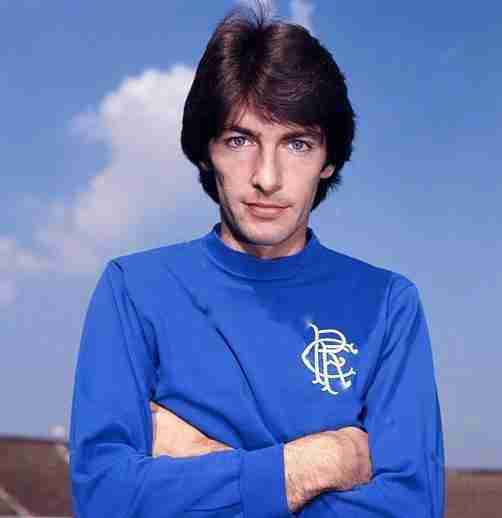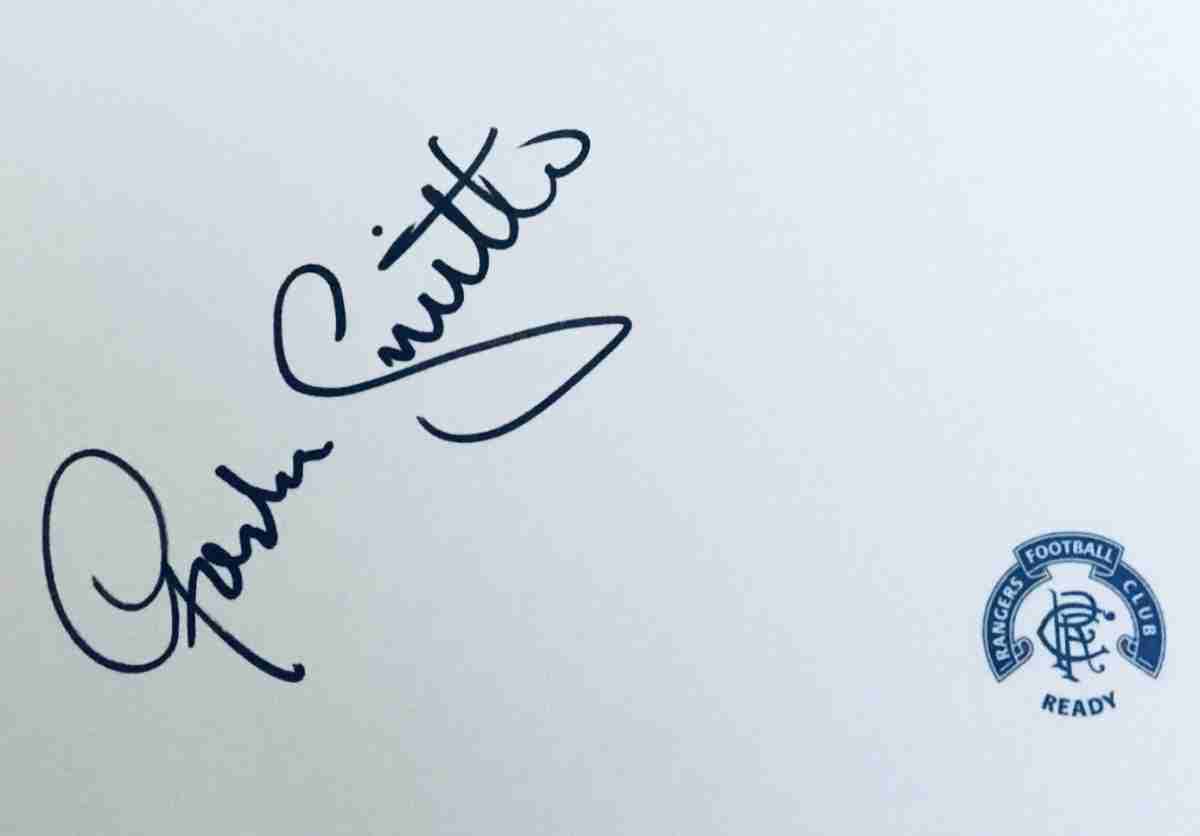

Gordon Smith (1977 to 1980) & (1982)
An Ayrshire boy, Gordon was born in Kilwinning but brought up in the neighbouring Town of Stevenston. His grandfather was the legendary ‘Mattha’ Smith of Kilmarnock and, from an early age, Gordon set his sights on becoming a professional footballer. It was not long before he was attracting interest and by the age of 14 he had a queue of senior Clubs (including both Old Firm sides) looking to sign him on ‘S’ Forms. Although a Rangers supporter, he would opt for Rugby Park thus following in the footsteps of his famous grandfather. Despite his tender age, Smith would soon find himself training with the Kilmarnock first team squad during school holidays, rubbing shoulders with the likes of Tommy McLean and Eddie Morrison.
Gordon would spend 5 years in the Kilmarnock first team before eventually making the move to his boyhood heroes in the summer of 1977. Rangers manager Jock Wallace, a long time admirer of Smith, finally convinced the Ayrshire side to sell after many failed attempts. The fee was £65,000 with fans favourite Colin Stein making the opposite journey (initially on loan). Having made his name more as a left winger at Kilmarnock, the timing of Gordon’s arrival at Ibrox seemed curious with Rangers having recently completed the signing of talented winger Davie Cooper.
However, it would be in the middle of midfield that Wallace would utilise Gordon and to devastating effect. With Derek Johnstone playing in a lone striker role, Gordon would be the frequent runner from a midfield trio of Alex MacDonald and Bobby Russell whilst Cooper and McLean would operate in the wider positions. An elegant, skilful player who was equally comfortable with both feet, Gordon was also a strong runner with natural fitness and a clear eye for goal.
Although season 1977/78 started poorly (Rangers lost their first 2 league matches), it would prove to be one to remember. The domestic treble was secured for the second time in three seasons with new boys Smith, Cooper and Russell excelling in their first year together at Ibrox. Gordon would score in the League Cup Final win over Celtic, one of 27 goals scored in what was an astonishing ratio from midfield.
Gordon’s second season at Ibrox would see him finish as top scorer (18) at the Club, Derek Johnstone by now playing more frequently in central defence. Whilst the league was lost to Celtic in extremely disappointing fashion, John Greig’s side did retain both domestic Cups with Smith having now secured 5 major trophies in just two seasons. In addition, there were some memorable performances in the European Cup as Juventus and PSV were defeated. Gordon would score in the 2-0 win over the Italian giants at Ibrox.
His final season, 1979/80, saw him appearing in 47 matches although one third of his league appearances were from the bench. The goals had also started to dry up somewhat, a credible seven for the season but only two as the 1980’s dawned. His final appearance came in the Scottish Cup Final defeat to Celtic, most remembered for the fans of both sides clashing on the Hampden pitch at full time.
Although Gordon’s relationship with John Greig was not at the level he had enjoyed with previous manager Jock Wallace, it was still a surprise to the player when he learned that Rangers were more than willing to offload him. Still only 25, Smith was clearly viewed as one of the most sellable assets and there was no doubt that Greig had to trade in order to raise funds to freshen up a now ageing squad. With Rangers having agreed a record fee of £440,000 with Brighton & Hove Albion, the writing was on the wall for Smith despite the player having only recent signed a new 5-year contract. He would soon depart Ibrox for the next chapter of his career in English football.
Gordon would play and score in the 1983 FA Cup Final versus Manchester United which ended in a 2-2 draw. In the dying seconds at Wembley, he had a glorious chance from 8 yards to win the Cup but, with only the United keeper to beat, was thwarted. The TV commentator coined the famous phrase “and Smith must score….and he hasn’t scored……and Bailey has saved it”. With United winning the replay comfortably, his actual goal in the first game was soon forgotten prompting the title of his later autobiography – “And Smith Did Sore…”.
Prior to that FA Cup defeat, he had suffered another Final loss when he briefly returned to Glasgow at the end of 1982. Temporarily out of favour at Brighton, he headed back to Rangers on loan for one month and was immediately thrown into the 1982/83 League Cup Final at Hampden. After just one training session with his team-mates, he was back in the starting XI in what seemed like a desperate attempt to clinch silverware. It was possibly a last throw of the dice by Greig but one that failed. After a couple of low-key league matches, Smith soon returned to Brighton.
Gordon was never the stereotypical Scottish footballer. Having turned out for the likes of Manchester City and Oldham Athletic following his time at Brighton, he was keen to experience life in the European Leagues of Austria and Switzerland before returning to a career in business. Even during the height of his treble winning season at Ibrox, he had done so whilst undertaking a marketing role within a local firm! A spell as assistant manager at St. Mirren was followed by a stint as an approved Football Agent. He then became Chief Executive of the SFA but grew frustrated with the lack of empowerment.
By the summer of 2011 Gordon was back at Ibrox, appointed Director of Football following a change in structure in the aftermath of Craig Whyte’s controversial takeover. By Smith’s own admission, the role was almost redundant from the outset with the illusive Whyte seemingly keeping staff in the dark. As the Club went into financial meltdown, Smith relinquished his post.
by Rick Plews
